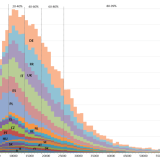
Εύρυθμες αγορές εργασίας χωρίς αποκλεισμούς
Οι εύρυθμες αγορές εργασίας αποτελούν προϋπόθεση για την πλήρη αξιοποίηση των δυνατοτήτων δημιουργίας θέσεων απασχόλησης σε μια οικονομία που βγαίνει από μια χρηματοπιστωτική και οικονομική κρίση. Η κρίση είχε εντελώς διαφορετικές συνέπειες στις αγορές εργασίας των κρατών μελών της ΕΕ, έπληξε δε πολύ σφοδρά ορισμένες ομάδες όπως οι νέοι και οι εργαζόμενοι με χαμηλό μορφωτικό επίπεδο. Οι ταχείες και συνεχιζόμενες διαρθρωτικές αλλαγές δημιουργούν επίσης νέες προκλήσεις όσον αφορά πιθανές ελλείψεις εργατικού δυναμικού και αναντιστοιχίες δεξιοτήτων σε διάφορους κλάδους και περιφέρειες.
Το κύριο εργαλείο της ΕΕ για την προώθηση της απασχόλησης και της κοινωνικής ένταξης είναι το Ευρωπαϊκό Κοινωνικό Ταμείο, το οποίο βοηθά τους ανέργους να βρουν δουλειά, συμβάλλει στην κοινωνική ένταξη όσων βρίσκονται σε μειονεκτική θέση και διασφαλίζει πιο δίκαιες ευκαιρίες ζωής για όλους. Επίσης η ευρωπαϊκή νομοθεσία ρυθμίζει τα δικαιώματα των εργαζομένων στην αγορά εργασίας σε ένα ευρύ φάσμα τομέων. Επιπλέον, τον Απρίλιο του 2017, η Ευρωπαϊκή Επιτροπή δρομολόγησε τον ευρωπαϊκό πυλώνα κοινωνικών δικαιωμάτων. Ο εν λόγω πυλώνας βασίζεται στην ενωσιακή κοινωνική πολιτική και στην πολιτική για την απασχόληση, τις οποίες και συμπληρώνει, με στόχο να παρέχει κατευθύνσεις στη χάραξη πολιτικών σε διάφορα ουσιώδη πεδία για την εύρυθμη και δίκαιη λειτουργία των αγορών εργασίας και των συστημάτων κοινωνικής πρόνοιας.
- Ευρωπαϊκή Επιτροπή: Ευρωπαϊκό Κοινωνικό Ταμείο
- Ευρωπαϊκή Επιτροπή: Ευρωπαϊκός πυλώνας κοινωνικών δικαιωμάτων




























